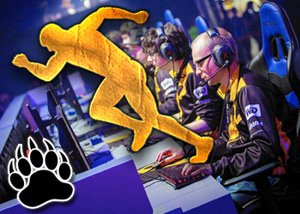Canadian online casino reviews, free casino games, casino bonuses, news, expert guides & more.

Scientists at the German Sports University have carried out a study on a group of eSports professionals and they have been surprised by the results. They have discovered that these professional players are exposed to physical strains similar to those of "normal" athletes.
This scientific study began five years ago and was conducted by Professor Ingo Froböse. He has since become something of a pioneer, and an expert in prevention and rehabilitation at the German Sports University in Cologne. He became the very first scientist to conduct a study on athletes that compete in eSports. Froböse was the first person to every look at the demands that are place on an eSports players, the kind of training they need to go through to compete, or the kinds of strains they are exposed to during tournaments. The results were quite surprising.
He said, "We were particularly impressed by both the demands placed on the motor skills and their capabilities. The eSports athletes achieve up to 400 movement on the keyboards and the mouse per minute, four times as much as the average person. The whole thing is asymmetrical, because both hands are being moved at the same time and various parts of the brain are also being used at the same time."
This level of strain was something that Froböse had never observed in any other sport, not even in table-tennis players, who require a high level of hand-eye coordination.
Froböse has rejected the idea that eSports players are just randomly hammering away at their keyboards and moving their mice. He noted that strategic games such as Counter Strike or League of Legends are extremely complex. In addition to using motor skills, these game require a high degree of tactical understanding in order for players to defeat their opponents.
To learn more about this, scientists at the German Sports University conducted tests aimed at determining the demands placed on the athletes' minds, testing for the stress hormone cortisol.
Froböse said, "The amount of cortisol produced is about the same level as that of a race-car driver. This is combined with a high pulse, sometimes as high as 160 to 180 beats per minute, which is equivalent to what happens during a very fast run, almost a marathon. That's not to mention the motor skills involved, so in my opinion, eSports are just as demanding as most other types of sports, if not more demanding."
A lot of eSports players don't seem to understand the demands that are being placed on them or their bodies and have failed to adjust their training methods and nutritional intake to suit this. Years of study have shown that most competitors do not prepare themselves for competition in a professional manner.
Froböse said, "In terms of their fitness, many of our test subjects are simply average citizens, and average citizens worry me. They simply aren't fit. For example, they fail to do exercises that would strengthen the whole support system in the shoulder and neck areas. Were they to do this, this would improve their fine-motor skills in the arm area, something that is extremely important in competition."
For most eSports competitors, training methods consists entirely of playing on the computer and this was confirmed by Rene Pinkera, whose team SK Gaming, won the world championship in World of Warcraft at the BlizzCon 2015 tournament in Anaheim.
He said, "We do a short warmup, we do a couple of stretches with our arms and our hands. After that we play, because that is what it is all about. We do that for at least six hours a day, sometimes as many as 12."
Froböse is concerned about this and he explains that Pinker is no exception and the training regimes of the majority of eSports professionals consists of spending hours in front of the computer every day. He believe they should be doing regular physical training also.
Froböse also said, "What isn't happening is cycling the stress, in other words, building in breaks after periods of strain so that the athlete can recover and overcome fatigue during competition. Another factor is getting the right nutrition and eSports athletes should have similar diets to that of other competitive athletes, including added nutrients to increase circulation in the brain."
Pinkera said that he has noticed that many eSports professionals don't pay enough attention to what they are eating. "You always see opponents with energy drinks and other beverages that are loaded with sugar, people who don't watch what they eat. We try to avoid sugar, we eat a banana beforehand, or maybe a muesli bar, and you can't go wrong by drinking water."
Froböse has stated that the average eSports athlete's career is very short and usually ends in their mid 20's. With better diet and exercise this could extend their careers by four to five years.
The eSports study comes just ahead of an announcement by Playtech who are launching a Virtual Sports platform in 2016 which will include games like football, tennis, basketball, and horse racing. Will these study results encourage more participation in eSports or will it take away from the fun and enjoyment that many players have come to love.
You can view Playtech's introductory video for their Virtual Sports platform below:




Be the first to know about new online casinos, the latest free slots games and receive exclusive promotions. We guarantee privacy, so your email is safe and secure.

Welcome to grizzlygambling.com - the whole team welcomes you to our player community. It is our mission to inform members of the latest events on the Canadian market so you can enjoy the best in online casino gambling.